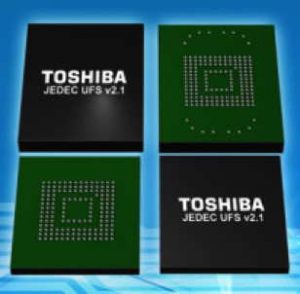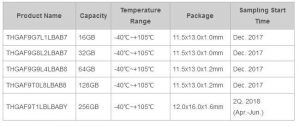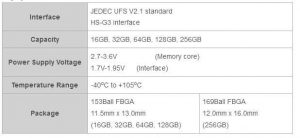Toshiba UFS Embedded NAND Flash Memory for Automotive Applications
16 to 256GB, operating temperature of -40°C to +105°C,
This is a Press Release edited by StorageNewsletter.com on December 22, 2017 at 2:59 pmToshiba Memory America, Inc. (TMA), U.S.-based subsidiary of Toshiba Memory Corporation and maker of Universal Flash Storage (UFS) devices [1], begun the sampling of Automotive UFS (JEDEC ver. 2.1 HS-G3) embedded memory solutions.

The Automotive UFS supports a wide temperature range (-40°C to +105°C), meets AEC-Q100 Grade2 [2] requirements and offers enhanced reliability capabilities that increasingly complex automotive applications require. The lineup consists of a range of capacities: 16, 32, 64, 128, and 256GB.
Automotive UFS supports a wide temperature range, meets AEC-Q100 Grade2 requirements and offers the performance, reliability and density required by increasingly complex automotive applications.
The addition of Automotive UFS expands the firm’s lineup of embedded NAND flash memory products for automotive applications – joining its Automotive e-MMC [3] family. The storage requirements for automotive applications continue to increase as entertainment and information systems and ADAS [4] in cars become more sophisticated. UFS support the performance and density needs of these applications.
“Automotive storage requirements continue to expand across a variety of applications within the vehicle as they become more autonomous,” said Gregory Wong, president, Forward Insights. “This includes the memory used for ADAS recognition and decision components, V2X components, infotainment and clusters. Toshiba’s broad density lineup of high-speed UFS memory for automotive is perfectly positioned to support this trend.“
These Automotive UFS devices are based on the company’s 15nm process technology. By utilizing the UFS interface, higher performance than Automotive e-MMC is realized. For example, sequential read is 2.7 times, sequential write is 1.1 times, random read is 7 times, and random write is 4.4 times faster (approximately) than Automotive e-MMC [5].
“Our UFS for consumer applications boosts overall system performance in mobile devices, and the introduction of Automotive UFS will have a similarly positive impact on the development of in-vehicle infotainment and ADAS systems,” noted Scott Beekman, director, managed flash memory products, TMA. “As the storage requirements for automotive applications continue to accelerate, Toshiba will continue to lead the market forward by reinforcing our lineup of high-performance, high-density memory solutions targeted to the automotive sector.“
Several new functions have been added to Automotive UFS, such as refresh, thermal control and extended diagnosis, which are suited to the requirements of automotive applications. The refresh function can be used to refresh data stored in UFS and helps to extend the data’s lifespan. The thermal control function protects the device from overheating in high-temperature circumstances that can occur in automotive applications. Lastly, the extended diagnosis function helps users understand the device’s status.
Lineup of products:
Key features:
-
Temperature range
Supports operating temperature range of -40°C to +105°C. Reliability tests were conducted to meet AEC-Q100 Grade2 specifications, in addition to JEDEC compliance tests. -
Capacity range
Supports capacity range from 16 to 256GB. Suitable for a variety of automotive applications, such as entertainment and information systems and ADAS, which typically require capacity storage, as well as other applications (such as wireless communication) that may need only smaller capacity. -
Performance
Realizes higher performance compared to Automotive e-MMC. -
Additional functions
Supports additional functions designed for automotive applications, such as refresh, thermal control and extended diagnosis. -
Integrated NAND flash memory management
The JEDEC UFS V2.1 compliant interface handles functions, including bad block management, error correction, wear leveling, and garbage collection. As a result, UFS devices simplify design when compared to standalone memory integrated circuits with a standard NAND flash interface.
Key specifications :
[1] Universal Flash Storage (UFS) is a product category for a class of embedded memory products built to the JEDEC UFS standard specification.
[2] Electrical component qualification requirements defined by the AEC (Automotive Electronics Council).
[3] e-MMC is a product category for a class of embedded memory products built to the JEDEC e-MMC Standard specification.
[4] Advanced Driving Assistant System
[5] Comparison of 64GB devices.
Product density is identified based on the density of memory chip(s) within the product, not the amount of memory capacity available for storage by the end user. Consumer-usable capacity will be less due to overhead data areas, formatting, bad blocks, and other constraints, and may also vary based on the host device and application. 1GB is calculated as 1,073,741,824 bytes.
















 Subscribe to our free daily newsletter
Subscribe to our free daily newsletter


